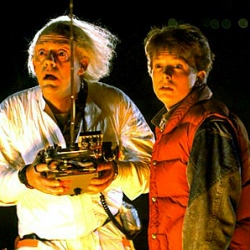 Halloween was several days ago, which can only mean one thing. Christmas is upon us. Yes, yes, I know Thanksgiving is in there somewhere, but so far our WalMart overlords haven’t figured out how to commercialize that day beyond a good sale on canned cranberry jelly. So it doesn’t count. It’s Christmas dammit! Why aren’t you out shopping?
Halloween was several days ago, which can only mean one thing. Christmas is upon us. Yes, yes, I know Thanksgiving is in there somewhere, but so far our WalMart overlords haven’t figured out how to commercialize that day beyond a good sale on canned cranberry jelly. So it doesn’t count. It’s Christmas dammit! Why aren’t you out shopping?
Actually several members of my family (those with a preponderance of X-chromosomes), started the Christmas season months ago. I know this because they started pestering me in July for what I wanted for Christmas, and for what they should buy my teenage sons. Some consider themselves behind if Labor Day comes and goes and they aren’t wrapping presents yet.
I don’t believe for a minute they simply enjoy gift shopping so much they have to start 6 months early because they can’t wait. Catch them overtired or with an extra glass of wine and they’ll even admit that while they love the idea of Christmas gifts, the reality is a pain in the tuckus, and they are just trying to get it out of the way.
In fairness, it’s not all downside. Pretty much everyone relishes seeing the unmitigated joy on a young child’s face as they open a Christmas gift. And kids’ needs and desires change so frequently in those early years that shopping for them is often fun. But shopping for anyone over 15 gets a little dicier. When shopping for older folks, gifts tend to fall into one of two categories. Stuff they don’t want, and stuff you can’t afford. Which explains why on Christmases-past you may have wanted an HDTV, but instead exclaimed, “Yay! Socks!” while quietly dying a little bit inside.
Retailers recognized this problem, and in recent years the advent of e-commerce and online wish lists have made things easier for shoppers to buy gifts people actually desire and value. In theory, you just hit up your intended’s Amazon Wish List and select from the bounty of gifts he or she has expressed an interest in… And a couple of clicks later, you’re done. Which would be bloody brilliant except that most of us don’t bother adding things to our wish lists. All of which earns us the ire of our loved ones who berate us for depriving them of the opportunity to conveniently show us how much they love us.
So now, instead of struggling to find the perfect gift for Mom, you struggle to find the perfect gift for Mom to give you. It’s not clear this is better. And whatever element of surprise there was in the giving of gifts has vanished. “Oh look! The new razor I picked out for me. What a splendid wrapping job you did on it. Is there any pie left?”
It’s tempting to argue that maybe us older folks should just mutually agree to wallow in each other’s company, embrace the warmth and the strength of our familial bonds, and forgo the whole gift exchange… but apparently that’s just crazy talk. “These are traditions dammit, and it wouldn’t be Christmas if you didn’t get to open something. So, just shut your heretical pie hole and tell me what to buy you!”
Looking at the evolution of gift giving on Christmas we see the following progression of things we give to others to celebrate the day:
- Myrrh from afar or the occasional drum solo
- Small handmade crafts, toys, or edible treats
- Small elf-made crafts or toys
- Thoughtfully or desperately chosen commercially produced stuff
- Commercially produced stuff chosen by the giftee
Our entire economy is now dependent on Christmas shopping, so we can’t return to just offering each other a little pa-rum-pum-pum-pum without risking a collapse of the entire stock market, and I am not living through 2009 again. Instead, let’s push this forward. I think it’s time we move this along to its next evolutionary stage.
Why don’t we all just take responsibility for not only selecting, but for purchasing and wrapping gifts for ourselves from all our loved ones. Just put their name on it and place it under the tree. This is a sure way to restore the magic of the day, or at least the element of surprise. Sure, you’ll still know everything you’re getting, but you’ll have no idea what you’ve given. Maybe you’ll choose to have the whole family chip in on that TV. Maybe they’ll each give you an individually wrapped Oreo. Have you been naughty or nice this year? Who knows? You do! (Certainly they don’t.) Oh, the fun of Christmas morning is back.
Who’s with me?




